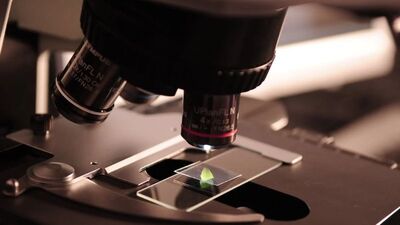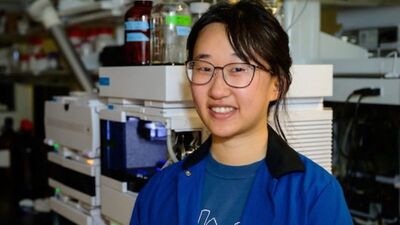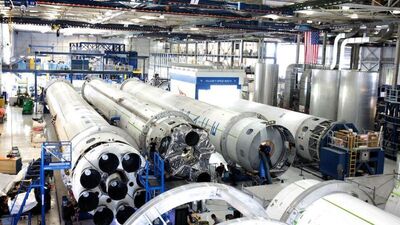News from 2023
STAR Physicists Track Sequential ‘Melting’ of Upsilons
By DOE Newswire Report | Jun 24, 2023
Scientists use the Relativistic Heavy Ion Collider (RHIC), a Department of Energy user facility, to recreate and study the hot particle soup that existed in the very early universe.
Directly Imaging Quantum States in Two-Dimensional Materials
By DOE Newswire Report | Jun 24, 2023
When some semiconductors absorb light, excitons (or particle pairs made of an electron bound to an electron hole) can form.
Fusion Simulations Reveal the Multi-Scale Nature of Tokamak Turbulence
By DOE Newswire Report | Jun 24, 2023
Creating efficient, self-sustaining fusion power requires good confinement of the heat in the plasma.
DOE Announces Over $21 Million to Advance Commercialization of Clean Energy Solutions
By DOE Newswire | Jun 24, 2023
Release: New Investments Will Increase Access to Clean Energy Technologies and Support America’s Transition to a Clean Energy Economy
New nontoxic powder uses sunlight to quickly disinfect contaminated drinking water
By DOE Newswire Report | Jun 24, 2023
A low-cost, recyclable powder can kill thousands of waterborne bacteria per second when exposed to sunlight.
Landmark yeast study provides framework for understanding biodiversity, applications
By DOE Newswire Report | Jun 24, 2023
Better understanding of the family responsible for nearly all bread, fermented drinks, and biofuels creates a path to finding new strains with potentially useful traits.
Clemson University team leads sustainable energy research
By DOE Newswire Report | Jun 24, 2023
A group of Clemson University researchers led a study that was recently published in the journal Nature Communications and is aimed at developing advanced materials for mitigating greenhouse gas emissions and building a clean and sustainable energy future.
A Nanocrystal Shines On and Off Indefinitely
By DOE Newswire Report | Jun 24, 2023
In 2021, lanthanide-doped nanoparticles made waves—or rather, an avalanche—when Changwan Lee, then a PhD student in Jim Schuck’s lab at Columbia Engineering, set off an extreme light-producing chain reaction from ultrasmall crystals developed at the Molecular Foundry at Berkeley Lab.
Scientists report world’s first X-ray of a single atom in Nature
By DOE Newswire Report | Jun 24, 2023
Ateam of scientists from Ohio University, Argonne National Laboratory, the University of Illinois-Chicago, and others, led by Ohio University Professor of Physics, and Argonne National Laboratory scientist, Saw Wai Hla, have taken the world’s first X-ray SIGNAL (or SIGNATURE) of just one atom.
Graduate Student Selected for DOE Research Program at Sandia National Lab
By DOE Newswire Report | Jun 24, 2023
The Department of Energy’s (DOE’s) Office of Science has selected physics graduate student Adam Christensen from The University of Texas at Austin to participate in the Office of Science Graduate Student Research (SCGSR) Program.
Treatment creates steel alloys with superior strength and plasticity
By DOE Newswire Report | Jun 24, 2023
A new treatment tested on a high-quality steel alloy produces extraordinary strength and plasticity, two traits that must typically be balanced rather than combined.
Axions whisper, but can you hear them? FAMU-FSU College of Engineering researchers think so
By DOE Newswire Report | Jun 24, 2023
To hear an axion, you have to be listening very, very carefully.
Rice U. grad student wins DOE research award
By DOE Newswire Report | Jun 24, 2023
The goal of the program is to prepare graduate students for science, technology, engineering or mathematics (STEM) careers critically important to the DOE Office of Science mission by providing graduate thesis research opportunities through extended residency at DOE national laboratories.
What did Energy Department publish on June 23?
By DOE Newswire | Jun 24, 2023
The US Energy Department published a two page notice on June 23, according to the U.S. Government Publishing Office.
Layers of self-healing electronic skin realign autonomously when cut
By DOE Newswire Report | Jun 24, 2023
Human skin is amazing. It senses temperature, pressure, and texture.
UVA-Led Discovery Challenges 30-Year-Old Dogma in Associative Polymers Research
By DOE Newswire Report | Jun 24, 2023
A University of Virginia-led study about a class of materials called associative polymers appears to challenge a long-held understanding of how the materials, which have unique self-healing and flow properties, function at the molecular level.
Energy Department discusses Combined Notice of Filings #1 on June 23
By DOE Newswire | Jun 24, 2023
The US Energy Department published a two page notice on June 23, according to the U.S. Government Publishing Office.
Laboratory for Laser Energetics joins team to develop commercial fusion energy
By DOE Newswire Report | Jun 24, 2023
The US Department of Energy program partners private companies with national laboratories and universities to design the first commercial fusion power plant.
Researchers Demonstrate Secure Information Transfer Using Spatial Correlations in Quantum Entangled Beams of Light
By DOE Newswire Report | Jun 24, 2023
Researchers at the University of Oklahoma led a study recently published in Science Advances that proves the principle of using spatial correlations in quantum entangled beams of light to encode information and enable its secure transmission.
Energy Department discusses Transmission System Planning Performance Requirements for Extreme Weather on June 23
By DOE Newswire | Jun 24, 2023
The US Energy Department published a two page rule on June 23, according to the U.S. Government Publishing Office.












